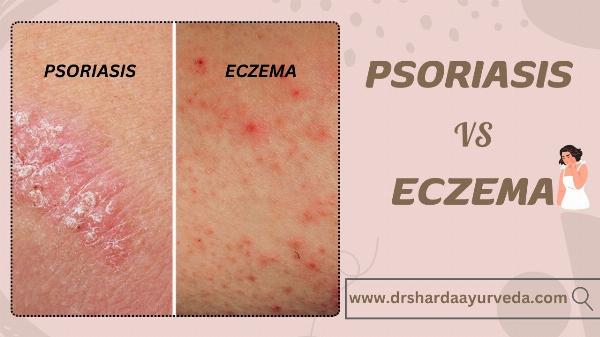Psoriasis Vs Eczema: An Ayurvedic Perspective

Strong 8k brings an ultra-HD IPTV experience to your living room and your pocket.
Overview
Eczema and Psoriasis are common skin disorders that may come with similar-looking symptoms like inflammation, irritation, and skin discoloration, but they are fundamentally different in nature. To a common eye, there can be a great fuss about psoriasis vs. eczema but it is easy for a medic to differentiate between the two. Psoriasis is an autoimmune disorder while eczema can be a result of various environmental factors. While psoriasis tends to cause scaly plaques, eczema causes bumps on the skin. In the worst cases, skin grows and merges with another patch. Ayurveda offers a holistic approach to dealing with psoriasis and eczema. Both diseases might look similar but eczema ayurvedic treatment and psoriasis ayurvedic treatment are fundamentally different.
Both skin disorders tend to look similar, but there are well-defined differences in their origin, outlook, and triggers. Some of the key differences between psoriasis vs eczema treatment are:
Age of onset: Children are much more likely to be diagnosed with eczema, but it can also occur in adults. On the other hand, Psoriasis mostly develops in the age of 15 to 35.
Triggering factors: Psoriasis can be triggered by factors like infections, certain medications, excessive alcohol, smoking, stress, or injury to the skin. Eczema, on the contrary, can be triggered by allergens, dry weather, or the use of harsh products on the skin.
Itching: Itching can be really high in eczema and can even result in bleeding while there is a mild itch in psoriasis.
Appearance: In psoriasis, there are raised, red patches on the skin covered with silvery-white plaques. Eczema is usually characterized by itchy and inflamed skin which results in the formation of small, fluid-filled blisters.
Affected areas: Eczema symptoms tend to occur in the folds like inside the elbows, behind the knees, around the neck, or eyes. Conversely, psoriasis often attacks outer surfaces like elbows, knees, scalp, nails, or lower back.
Autoimmune disorder: Psoriasis is an autoimmune disorder that results in the overproduction of skin cells while eczema is a result of certain genetic and environmental factors.
Sunlight: Psoriatic patients are advised to sit in mild sun rays which might help ease the symptoms, But, eczema patients must stay away from sunlight.
Symptoms
Both Psoriasis and eczema are characterized by dry and itchy skin but there are fundamental differences in their symptoms.
Psoriasis
Psoriasis tends to cause skin patches covered with silvery white flakes which easily fall off. It results in raised and thickened areas of the skin that are red or pink in color. Psoriatic patches can be itchy or can even cause a burning sensation. It causes discoloration of the skin and even small dents on the nails. In extreme cases, it can result in separation of the nail from its nail bed.
Eczema
Eczema is often characterized by an itchy rash with raised bumps or blisters filled with some fluid. These blisters can even burst out due to itching or irritation. Eczema can result in very heightened levels of itching which can even affect the sleep of an individual. Affected areas can become swollen and inflamed. Prolonged eczema can even lead to skin discoloration.
These symptoms vary from person to person depending upon the severity of the disease.
Ayurvedic Perspective
As per Ayurveda, every individual has a unique combination of the three doshas i.e. Vata Pitta and Kapha. Any disorder is a result of an imbalance of these doshas. Psoriasis and eczema are a result of imbalanced doshas and increased heat in the body. Foods like pepper, jaggery, dry fruits, and spices can increase the heat in the body which further causes dryness and skin disorders. Incompatible food combinations, dairy, meat, alcohol, or smoking can result in the production of toxins in the body which accumulate and can manifest as eczema or psoriasis.
Causes
Eczema Causes
Sensitive skin: Heightened skin sensitivity is one of the primary causes of eczema. Such people are much more vulnerable to developing skin disorders.
Allergens: Various allergens like pollens, environmental pollution, toxins, or chemicals can lead to the accumulation of toxins on the skin and thus cause eczema.
Diet: Incompatible foods like milk with food can result in the production and
accumulation of toxins causing eczema.
Lifestyle: Sedentary habits, irregular sleep patterns, lack of physical activity, bathing after heavy meals, or jumping from cold to hot areas rapidly can increase the risk of being diagnosed with eczema.
Stress: Negative emotions if not dealt with in time can lead to frustration, anger or depression which can make your body host to diseases and can also cause eczema.
Environment: Hot and humid weather conditions or changing seasons make people more susceptible to skin diseases.
Chemical-based skin care products: Using harsh soaps, detergents or other skin care products can disturb the PH levels of the skin, Making it vulnerable to infections and disorders.
Psoriasis Causes
Genetics: Genetics plays a huge role in the disease pattern of an individual. A genetic history of psoriasis makes one more vulnerable to encountering it.
Food: Excessive intake of oily foods, honey, radish, or fish can be the underlying reason for psoriasis. Incompatible food combinations like sour and salty food together, unwholesome foods, and vegetables with milk can lead to psoriasis.
Habits: A lazy and inactive lifestyle and irregular sleeping patterns can lead to an imbalance of doshas and thus can also lead to skin problems.
Mindful eating: Overeating or eating without hunger can result in indigestion. It causes disturbance in the digestive system which results in the accumulation of toxins and thus can lead to psoriasis.
Emotional Factors: Negative emotions like stress and anxiety can lead to anger and frustration which can also raise heat levels in the body and cause psoriasis.
Physical injury: Injuries or wounds if left unattended can lead to infections or skin disorders.
Suppression: Suppression of natural urges like vomiting or urinating can lead to a toxin hike in the body causing psoriasis.
Treatment
According to Ayurveda, the primary aim of the treatment is to detoxify the body and remove the disease-causing factors. A healthy skincare routine is a must for psoriatic or eczema patients. Ayurvedic pastes, medicines, oils, and remedies harness the healing properties of various herbs that soothe your skin naturally.
Here are simple Ayurvedic tweaks for faster healing.
Eczema ayurvedic treatment
Balancing Doshas: Creating a balance in the body is a crucial part of Eczema Ayurvedic Treatment. Vata and Kapha doshas are balanced while treating eczema.
Dietary regimen: Cooling foods like cucumbers and melons are recommended. Wholesome grains like red rice, green gram, or other easily digestible foods must be included in the diet. Avoid foods causing indigestion.
Herbs: Herbs like Neem, turmeric, aloe vera, manjistha, khadira, and sariva have anti-inflammatory and soothing properties that help in the treatment of eczema.
Oils: Neem, tea tree, jojoba, or olive oil can help ease the symptoms and moisturize the skin.
Lifestyle: Maintaining a healthy routine and getting quality sleep can be beneficial for improving the symptoms.
Emotional management: Staying in a positive and happy environment would release happy hormones which also help in curing diseases.
Baths: Adding herbal powder to your bath can be really effective in managing the symptoms of eczema.
Moderate Exercise: Adding mild yoga exercises can help in a healthy flow of fluids and remove toxins. It also enhances the metabolism of the body.
Psoriasis Ayurvedic Treatment
Balancing Doshas: Psoriasis Ayurvedic Treatment primarily focuses on balancing Pitta dosha.
Dietary regimen: Heavy-to-digest foods like meat and dairy to incompatible food combinations must be avoided.
Moderate Exercise: Breathing exercises or simple stretching, especially yoga can help in managing the symptoms of psoriasis.
Herbs: Various herbs like neem, turmeric, or guduchi have anti-inflammatory and detoxifying properties which can help in the treatment of psoriasis.
Lifestyle: It is advised to wear cotton clothes and clean the sweat or dust with soft clothes. Also, switching from hot to cold environments instantly shall be restricted.
Emotional management: Avoiding stress and staying joyful helps in curing various ailments and diseases.
Shower: A cold water bath can be helpful in soothing the rashes.
Sunlight: Mild rays of twilight zones can be extremely beneficial.
Takeaway
Ayurvedic medicines are very effective in healing and managing the symptoms. But excess of anything can be dangerous for health. Ayurvedic remedies are suggested to be followed under the guidance of a qualified Ayurvedic practitioner. One of the leading institutes in Ayurveda is Dr. Sharda Ayurveda. They offer personalized treatment based on individual constitutions and imbalances. Ayurveda aims to bring ancient wisdom to modern lifestyles. It uses natural remedies and preventive measures that help remove toxins, boost the metabolism, and improve overall well-being.
Note: IndiBlogHub features both user-submitted and editorial content. We do not verify third-party contributions. Read our Disclaimer and Privacy Policyfor details.


